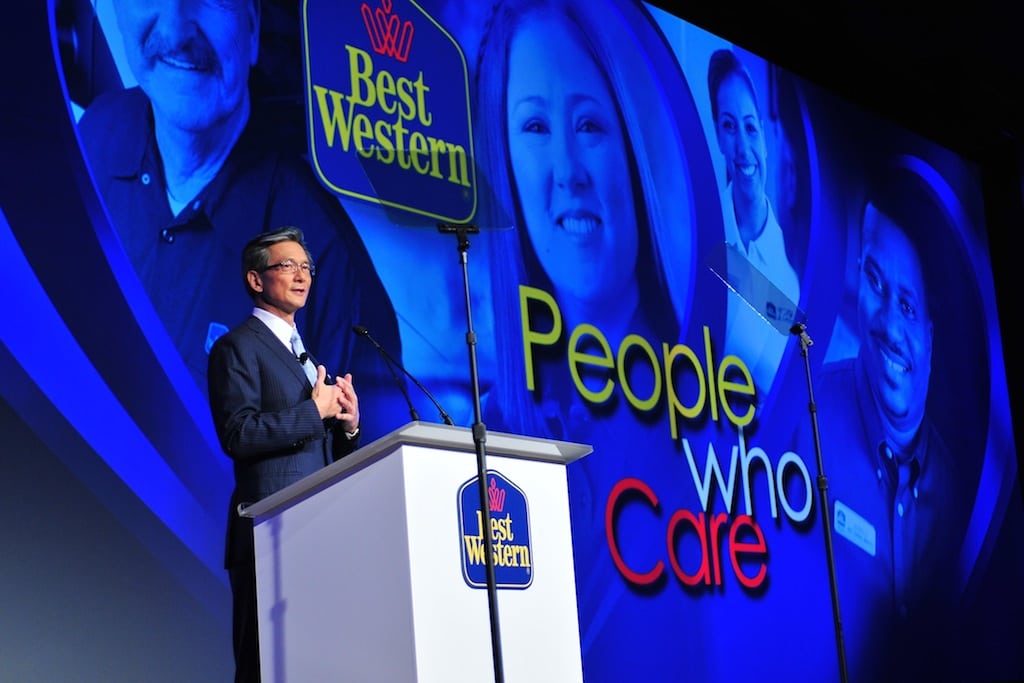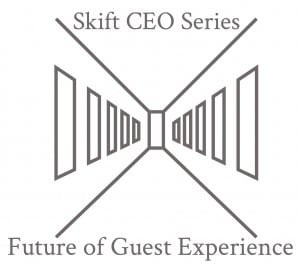Skift Take
Best Western has overcome its brand reputation in recent years to be recognized for its international foot print as well as innovation online and within properties.
Editor’s Note: Skift is running a series of interviews with hospitality CEOs talking about the Future of the Guest Experience and the evolving expectations and demands of hotel guests. Check out all the interviews as they come out here. This continues our series of CEO interviews, the previous series was on the Future of Booking, with online travel CEOs.
Many Americans think of Best Western as a standard road trip stopover without realizing its position as one of the largest hotel corporations in the world, or its emphasis on localization and innovation. Best Western International operates about 4,000 hotels, half of which are located in North America.
The corporation began differentiating its properties in 2002 with the launch of the more upscale brand Best Western Premier. It then expanded to a three-tiered system in 2011 and most recently entered the lifestyle brand arms race with its new tech-centric concept Vb.
All Best Western properties are individually owned so although each must meet a list of standards, many maintain an independent identity.
Best Western has also been recognized on several occasions for its digital acumen including extensive planning resources, engaged social accounts, and data tracking system that drives all business decisions.
Best Western’s CEO David Kong started out in the hospitality industry as a bus boy and worked his way up through several global hotel companies before joining Best Western as CEO in 2004. Kong is an outspoken advocate for the brand’s service, training programs, and digital innovation.
We asked him about how the corporation responds to evolving guests’ expectations, especially in light of its business structure. The edited interview is as follows:
Skift: What are the biggest challenges you’re facing to improve the guest experience today?
David Kong: I think there’s so many that it’s hard to say which is the biggest issue. I’ll give you two for consideration: Competitors are constantly upping their game and there’s ever-rising customer expectations as a result of that.
For example, the breakfast is always being improved, the room design is always being refreshed, the high-speed Internet access is given with higher bandwidth. Customer expectation has evolved to mobile and people want to use our entertainment as well as have it on their devices. That’s driven a change in marketing as well.
We used to have three TV channels and now we have over 600. You have to have a presence not just on TV, but on YouTube and Facebook. You have to worry about searches on Google and on TripAdvisor. The technology and how the competition has reacted has evolved the customer expectation, which has caused us to really do things differently. I think, in general, the biggest issue would be the ever-rising customer expectations, driven by technology.
Skift: What’s one unexpected shift you’ve seen in guest expectations and demands in the last decades?
Kong: I think we expected most of the changes to take place including the Internet and how it’s changed how we do e-commerce, evolving to mobile commerce. The one unexpected thing is the speed of the change The iPhones were launched only seven years ago and now they’ve sold half a billion units. The adoption of these smartphones and mobile devices, and what customers want to do on them, is all changing really really fast. The pace of change, to me, is unexpected.
Skift: What role does technology play in improving the guest experience? Is consumer-facing or back-end technology more important or effective?
Kong: In terms of the guest experience, the most changes are happening around how they book reservations with Best Western. The technology has driven the rise of online travel agencies, it’s driven the redesign of our website, and it’s led us to now launch mobile apps. The second area is the experience at the hotel. The high-speed Internet bandwidth has to be raised very quickly, very regularly, and smartphones, in relation to entertainment, is also a component of that.
The check-in kiosk was rolled out about a decade ago and just hasn’t been adopted very well; however, the mobile check-in is something that we are working on. People want to do more with their smartphones. Even our customer surveys are now available on their smartphones. In terms of the back-office operations, I think it’s all about how we drive efficiency through technology, whether it’s record keeping or data analysis with the aid of technology.
Skift: How has the hiring process changed to match changes in the guest experience?
Kong: There are a lot of things that haven’t changed in that regard including how you assess them to find out whether they’re service-minded, helpful, friendly, and professional. Those things haven’t changed. What has changed is that we’re looking for whether that person can multi-task. Everybody is multi-tasking. The guest is multi-tasking so you need to be able to handle multiple things all at the same time. Also, we assess if the person is comfortable with technology, whether they can pick up how to use a new PMS system or revenue management system and if they can relate to a guest in terms of their devices.
Skift: What are your views on the increase in hotel fees and surcharges levied against guests?
Kong: I don’t think consumers like it so we frown on it too. For example, we have very strict rules as to what the hotels can and cannot charge. We allow resort fees, but we require them to be fully disclosed and what we include in the resort fees, whether it’s drinks, access to the water park, or tips. There are very very few of these surcharges. We, in general, do not allow it.
I think this depends on the segment that you compete in. Our segment, the broad mid-scale segment, is still viewed as a value buy so people are much more conscious about value. We need to be very careful not to compromise the value proposition.
In a luxury segment, you can get away with it, so why not? I know the chairman of a huge hotel company recently made a comment, “You look at airlines. Why are they so profitable now? Because of all the extra fees they levy whether it’s for baggage or certain seat assignment or change fees. All those things that have made their business so profitable. Why can’t the hotel industry do the same?”
Some hotels are going to start charging for things like early check-in, late check-out, because they can get away with it. I don’t know for how long they can get away with it. If the whole industry goes that route, then fine. If the whole industry doesn’t follow suit, that could be problematic.
Skift: How does Best Western’s business model differentiate it in the market place?
Kong: We are still in the hospitality business. We talk about distribution, technology, revenue management, but ultimately, we’re still in the hospitality business. Hospitality is what we stand for, it’s what we sell for our industry. You think about who can give hospitality to and it’s still about people. The way that we want to differentiate ourselves is around people, it’s around hospitality.
A lot of training is actually about caring and treating the guest like family. You go to a lot of hotels and it’s just part of a corporation, everything is very technology-driven, you check in on a kiosk or mobile phone, you skip the front desk, open the door with a mobile phone. The next day you take a grab and go breakfast and you leave by mobile check-out. You have absolutely no interaction with anyone in the hotel. How is that hospitality? You might as well stay at a factory. You lose the hospitality experience.
Skift: How do you train staff to do that?
Kong: We’re in our third generation of award-winning training. We talk about what each person can do to make a special experience for a guest, the role of leadership, how they can set the tone, how we can reach the level of hospitality that we want to achieve. We do a lot of training in that regard. We back it up with our system of hiring people. We also focus on some key touch points: check-in, check-out, the breakfast experience, high-speed Internet. We want to use those key touch points to show that we are a brand that cares. We want to do that better than anyone else.
Skift: Best Western puts out a lot of content on its blog and across all social media channels. Can you share your thoughts behind this content marketing strategy?
Kong: We set out three years ago to become a leader in the digital world and have made a concerted effort to do that. Setting the tone and having a focus on what you want to achieve is number one, the same applies to anything that you do. You have to have focus and leadership. We made that a priority and then we beefed it up, had people help us write blogs relevant to that segment or create interesting things that could be tweeted or posted on Facebook.
We also do charitable events like ‘Walk Your Dog with Cesar Milan‘ and that’s been a huge success on Twitter and Facebook. It creates something that people want to Tweet or write about on Facebook.
Skift: How have you seen social media and content marketing change the conversation that you’re able to have with guests?
Kong: It makes it far more interesting. If you were just doing marketing through the TV, whether it’s product placement or an actual advertisement, it’s so overdone. It’s got its place, but it’s not powerful enough to connect in a meaningful way. If you have content that’s relevant and people are interested in reading it then that’s far more powerful, especially if it’s not Best Western but a third-party like your friends or family or someone that you respect. That’s far more powerful and there’s an emotion associated with it.
Skift: What’s your favorite part of staying at a hotel?
Kong: The bed. I’m not usually in the hotel for very long. I’m in meetings the whole day and by the time that I get to the hotel it’s late and I only have time to go to bed and get up and go. I guess that’s the experience.
Have a confidential tip for Skift? Get in touch
Tags: best western, ceo interviews, foge
Photo credit: Best Western CEO David Kong speaks at the hotel group's 2012 convention. Best Western

